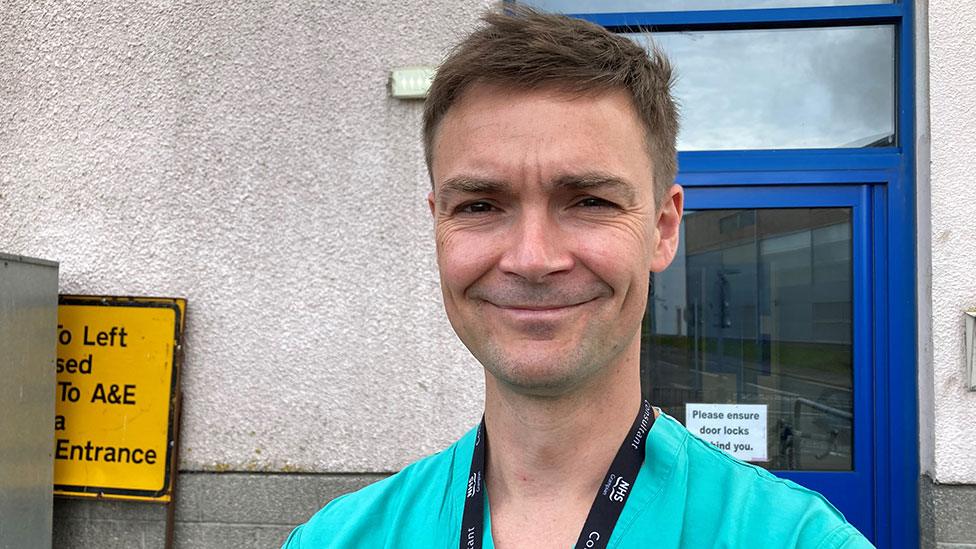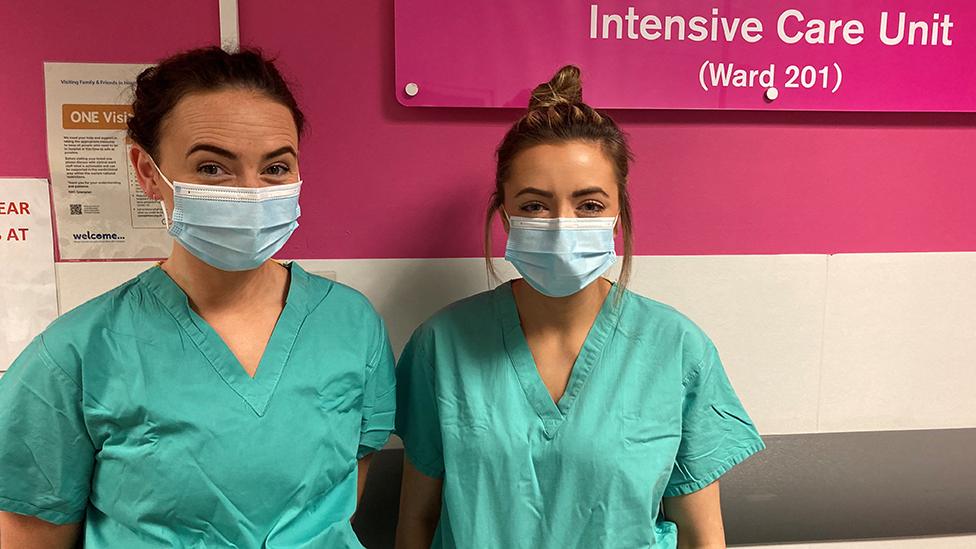Covid in Scotland: Latest ICU patients 'largely unvaccinated and young'
- Published

George McLean, 32, is recovering from a spell in ICU after contracting Covid
The latest wave of Covid patients in intensive care are "largely unvaccinated and young", one ICU consultant has told BBC Scotland.
Dr Lee Allan said he is treating "very young, usually fit and extremely sick" patients at Aberdeen Royal Infirmary.
The latest statistics show there were 82 people being treated for Covid in intensive care units in Scotland on Tuesday.
Hospital admission rates are higher among unvaccinated people.
More than 85% of people aged 18 and over in Scotland have now had both vaccine doses, but take-up is lower among younger people.
'I'm 32, don't drink, don't smoke - I didn't think it would be me'

One of those young people who has spent time in intensive care is George McLean. He's 32 and he's lucky to be alive.
He tested positive for the virus earlier this month after developing a "bit of a cough", but he was taken to Aberdeen Royal Infirmary by ambulance after he "got worse and worse and worse".
Struggling to breathe properly, he was rushed to ICU while his family and partner were informed he might have to be put into an induced coma.
It was overwhelming. He admits he was petrified.
"I've got four kids, I'm 32 years old, work every day, don't drink, don't smoke - didn't think it would be me," he said.
He had missed his appointment for a Covid jab and didn't consider rearranging.
"I've known many people who have had Covid and they've been fine, not even been to hospital, been off work for a couple of days and they're fine. I didn't think it would be as bad as what it was," he said.
In ICU, he had to lie on his front for three days and have full-face ventilation. It was uncomfortable but he avoided having to be put into a coma.
"They were dead professional, I was well looked after," he said. "I'm glad I was in the right place".
'Not all patients make it out of here'

Dr Lee Allan says his Covid patients are largely unvaccinated and young
ICU consultant Dr Allan said the last few weeks had been very busy. Staff are exhausted and there is uncertainty about what winter holds.
"One of the most difficult parts of that for us to cope with is that the patients are very young, usually fit and extremely sick," he said. "And not all patients are lucky enough to make it out of here.
"In the last few weeks, we've seen some of the most difficult times that we've experienced in the last year altogether. On the whole, the patients that we're seeing are largely unvaccinated and young.
"That's on the back of our usual workload of sepsis, trauma and post-operative patients so it continues to be an incredibly challenging time in intensive care."
He said the additional workload had led to difficult decisions about which patients can have their operations and receive ICU care - and which need postponed.
"It's incredibly frustrating for us looking after patients that are unvaccinated," he added. "There's always that thought that they might not have ended up in front of us if they'd had the vaccine.
"In this current busy period, there's no doubt that there are very few vaccinated patients ending up in intensive care.
"By far and away the most patients are unvaccinated, so the vaccine is looking from our perspective to be very effective."

How many unvaccinated people are in hospital with Covid?
Covid patient numbers are beginning to fall from their peak in mid-September, but they remain high.
The latest statistics published by the Scottish government show that there were 1,020 people in hospital on Tuesday with recently-confirmed Covid, and 82 in intensive care.
Separate figures published by Public Health Scotland, external shed light on the age breakdown of patients - and whether or not they have been vaccinated.

They show, broadly, that across all age groups, the rate of admissions per 100,000 is higher among unvaccinated individuals compared to those who are double-jabbed.
However, they do not differentiate between people who are admitted because they are ill with Covid, and people who are being treated for other health issues and do not require hospitalisation for the virus.
And they do not say how many unvaccinated people are in intensive care.
Additional data published on Wednesday reveals the average length of hospital stay of Covid patients has dropped from 13 in January, to 5.1 in June.

'It must be terrifying for patients'

ICU staff nurses Claire Charles and Rachael Ironside are working with Covid patients every day
ICU staff nurse Rachael Ironside said people don't realise how Covid can affect them - they think they're young and fit and they're getting their information from the "wrong sources".
"It is sad when you talk to families and they're talking about not getting the vaccine and the reasons they've had for it, but by that point it's too late," she said.
Her colleague Claire Charles said that by the time patients reach ICU, they have had all the treatments that have been proven to help, so they're just trying to "buy them some time" to try and get better.
"The people who do end up coming into hospital think they'll just be on the ward for a few days and then they come to us for a little bit more support, and that's tough for patients because they see some of the really unwell patients and it must be really terrifying to be in that situation, to see what's coming for them unfortunately," she said.
"That's hard for us as nursing staff to keep their spirits up and it's tough for us when they do become more unwell, and go onto the life support machine, and then sadly a lot of them pass away.
"They're coming in to us awake and talking, so it's hard at the end of the day when it doesn't go so well, and we have to deal with that side of it."

